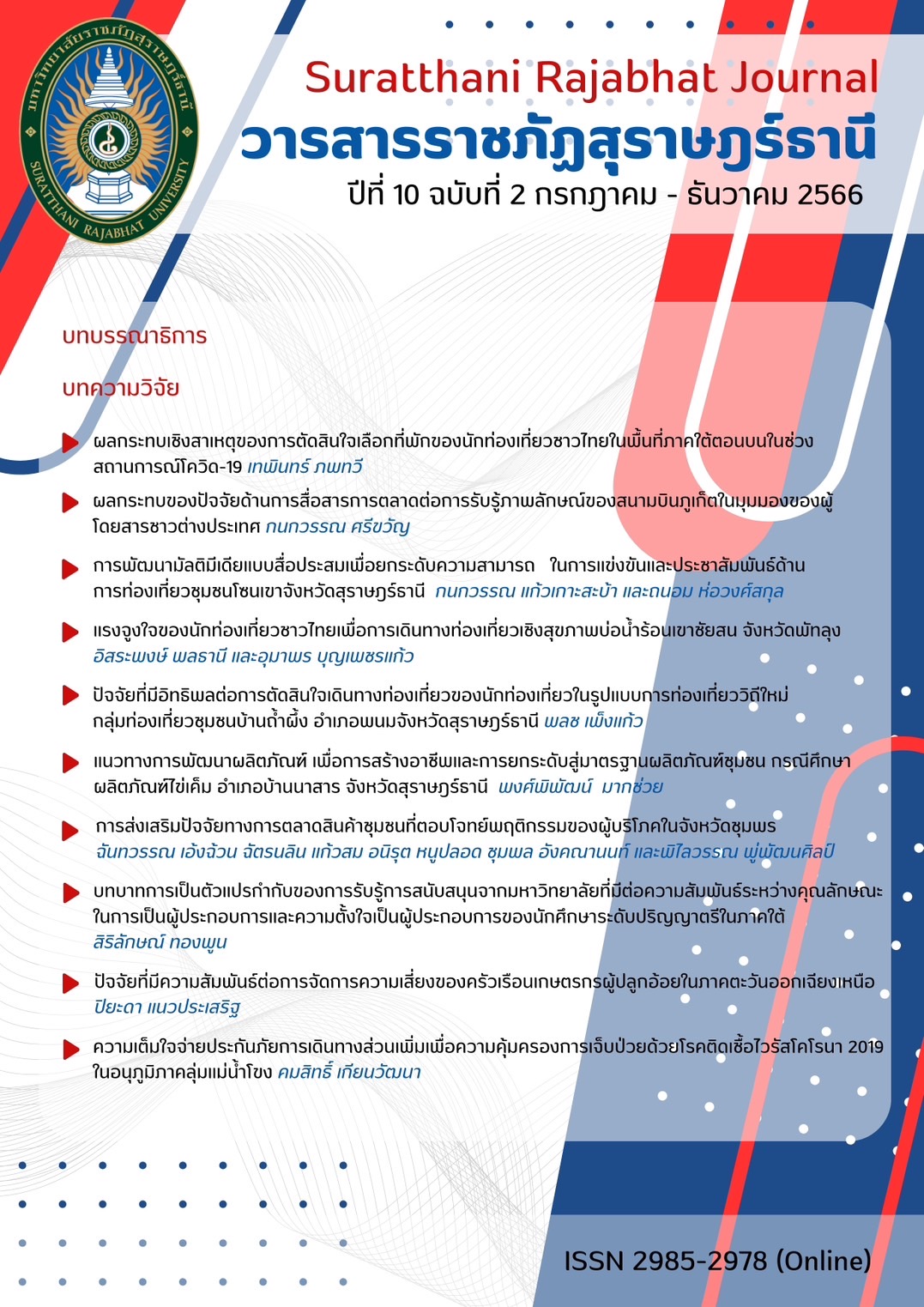Moderating Role of Perceived University Support on the Relationship between Entrepreneurial Characteristics and Entrepreneurial Intention among Undergraduate Students in Southern Thailand
Main Article Content
Abstract
The objectives of this research were to determine 1) the level of entrepreneurial intention among undergraduate students in Southern Thailand; 2) factors influencing entrepreneurial intention among undergraduate students in Southern Thailand; and 3) the moderating effects of perceived university support on the relationship between entrepreneurial characteristics (behavioral and psychological) and entrepreneurial intention. Five hundred surveys were provided to students selected to represent undergraduate students at southern universities. The author used descriptive statistics and hierarchical multiple regression. The findings indicated that pupils possessed a high level of entrepreneurial intent. The behavioral elements were slightly more prominent than the psychological components. Meanwhile, perceived university support was simply described as neutral. Additionally, entrepreneurial ambition was substantially influenced by subjected norm, perceived behavioral control, internal locus of control, innovativeness, and tolerance for achievement. Surprisingly, perceived university support had no effect on the correlations between independent and dependent variables that were moderated.
Article Details

This work is licensed under a Creative Commons Attribution-NonCommercial-NoDerivatives 4.0 International License.
References
Ajzen, I. (1991). The theory of planned behavior. Organizational Behavior and Human Decision Processes, 50(2), 179-211. https://doi.org/10.1016/0749-5978(91)90020-T
Anjum, T., Bai, V., R. & Phung, S., P. (2020). Moderating Role of University Support on the relationship between Effective Entrepreneurship Education and Entrepreneurial Intention. Test Engineering & Management, 83, 16377 – 16387. https://scholar.google.com/citations?view_op=view_citation&hl=en&user=k-XmynUAAAAJ&citation_for_view=k-XmynUAAAAJ:u5HHmVD_uO8C
Burns, N., & Grove, S.K. (1997). The Practice of Nursing Research Conduct, Critique, & Utilization. W.B. Saunders and Co.
Carlsson, B., Braunerhjelm, P., McKelvey, M., Olofsson, C., Persson, L., & Ylinenpaa, H. (2013). The Evolving Domain of Entrepreneurship Research. Small Business Economics, 41, 913-930. 10.1007/s11187-013-9503-y
Demers, J. (2018, January 29). Are Entrepreneurs Born or Made? Research Says Born but There’s a Catch. https://www.entrepreneur.com/article/308089
Denis, A., do Paço, A., Ferreira, J., Raposo, M., & Rodrigues, R.G. (2013). Psychological Characteristics and Entrepreneurial Intentions among Secondary Students. Education + Training, 55(8/9), 763–780. https://doi.org/10.1108/ET-06-2013-0085
Ferreira, J.J., Raposo, M.L., Gouveia Rodrigues, R., Dinis, A. & do Paço, A. (2012). A model of entrepreneurial intention: An application of the psychological and behavioral approaches. Journal of Small Business and Enterprise Development, 19(3), 424-440.
https://www.emerald.com/insight/content/doi/10.1108/14626001211250144/full/html
Hair, J. F., Black, W. C., Babin, B. J. & Anderson, R. E. (2010). Multivariate Data Analysis (7th ed.). Prentice Hall.
Hisrich, R. D., Peters, M. P., & Shepherd, D. A. (2005). Entrepreneurship (6th ed.). McGraw-Hill/Irwin.
Koyviriyakul, K. (2019). The Intention of Software Developers to be Startup Entrepreneurs. Journal of Information Systems for Business (JISB), 5(1), 59–71. (In Thai). https://jisb.tbs.tu.ac.th/wp-content/uploads/2022/10/4Krittin_N.pdf
Liñán, F., & Chen, Y. W. (2009). Development and cross-cultural application of a specific instrument to measure entrepreneurial intentions. Entrepreneurship Theory and Practice, 33(3), 593–617. https://doi.org/10.1111/j.1540-6520.2009.00318.x
Naushad, M. (2018). A Study on the Antecedents of Entrepreneurial Intentions among Saudi Students. Entrepreneurship and Sustainability Issues, 5(3), 600-617. https://doi.org/10.9770/jesi.2018.5.3(14)
National Statistical Office Thailand. (2021). Unemployment Rate. https://catalog.nso.go.th/dataset/0706_02_0016. (in Thai).
Pratitas, P. (2017). Impact of Cognitive Biases, Risk Perception, and Obstacles Perception to Creative Enterpreneur Intention of the Vocational Students in Bangkok Metropolitant. Panyapiwat Journal, 9 Special Issue, 171–181. (in Thai).
https://so05.tci-thaijo.org/index.php/pimjournal/article/view/94378/73778.
Prompatanapak, A. (2019). Entrepreneurial Intent and Orientation Developments in Thai Students under an Entrepreneurship Curriculum. BU Academic Review, 18(1), 98-113. (in Thai). https://so01.tci-thaijo.org/index.php/buacademicreview/article/view/140789/137477
Poolsawat, P & Supanti, D. (2020). Motivation towards entrepreneurial intention: A case study of business students in Southern region of Thailand. Journal of Management Walailak University, 9(1), 93–100. (in Thai). https://so06.tci-thaijo.org/index.php/wms/article/download/237907/162873/812863
Phuthong, T. & Sumalai, N. (2019). The Causal Relationship Model of Factors of Psychological Characteristics affecting the Youth Digital Business Entrepreneurial Intention among BBA Students. Veridian E-Journal, Silpakorn University (Humanities, Social Sciences and arts), 12(6), 418-444. (in Thai). https://he02.tci-thaijo.org/index.php/Veridian-E-Journal/article/view/190472
Rovinelli, R.J., & Hambleton, R.K. (1977). On the Use of Content Specialists in the Assessment of Criterion-Referenced Test Item Validity. Dutch Journal of Educational Research, 2, 49–60.
Saeed, S., Yousafzai, S.Y., Yani-De-Soriano, M., & Muffatto, M. (2014). The Role of Perceived University Support in the Formation of Students’ Entrepreneurial Intention. Journal of Small Business Management, 51(4), 1127-1145. https://doi.org/10.1111/jsbm.12090
Samitthikrai, C. (2005). Entrepreneurial potential of Thai University Students. Songklanakarin J. Of Social Sciences & Humanities, 11(3), 256-273. (in Thai). https://kaekae.oas.psu.ac.th/ojs/psuhsej/printarticle.php?id=306&layout=ps
Soomro, B. A., & Shah, N. (2015). Developing Attitudes and Intentions among Potential Entrepreneurs. Journal of Enterprise Information Management, 28(2), 304-322. https://doi.org/10.1108/JEIM-07-2014-0070
Stevenson, H. H., & Jarillo, J. C. (1990). A Paradigm of Entrepreneurship: Entrepreneurial Management. Strategic Management Journal, 11, 17–27. https://www.jstor.org/stable/2486667
Tong, X.F., Tong, D.Y.K., & Loy, L.C. (2011). Factor Influencing Entrepreneurial Intentions among University Students. International Journal of Social Sciences and Humanity Studies, 3(1), 487-496. https://dergipark.org.tr/tr/download/article-file/257399
Tripopsakul. (2015). The Study of Entrepreneurship Motivation on Business Growth and Business Growth Expectation: A Case Study of Thailand. Suthiparithat Journal, 29(90), 75-93. https://so05.tci-thaijo.org/index.php/DPUSuthiparithatJournal/article/view/244558/166189
Turker, D. & Selcuk, S.S. (2009). Which factors affect entrepreneurial intention university students? Journal of European Industrial Training, 33(2), 142-159. https://www.researchgate.net/publication/228872002_Which_Factors_Affect_Entrepreneurial_Intention_of_University_Students
Usman, B. & Yennita. (2019). Understanding the Entrepreneurial Intention among International Students in Turkey. Journal of Global Entrepreneurship Research, 9(10). 1-21. https://doi.org/10.1186/s40497-018-0136-0
Vanevenhoven, J. (2013). Advances and Challenges in Entrepreneurship Education. Journal of Small Business Management, 51(3), 466–470. https://doi.org/10.1111/jsbm.12043
Vodă, A.I., & Florea, N. (2019). Impact of Personality Traits and Entrepreneurship Education on Entrepreneurial Intentions of Business and Engineering Students. Sustainability, 11, 1-34. https://doi.org/10.3390/su11041192
Weiers, R. M. (2005). Introduction to Business Statistics. International Student (5th ed.). Duxbury Press.
Wongchaiya, S. & Pheunpha, P. (2018). The Influences of Business Strategies and Entrepreneur Characteristics on the Business Success of Small and Medium Entreprises. Journal of the Association of Researchers, 23(2), 139–152.
https://so04.tci-thaijo.org/index.php/jar/article/download/242079/164543
Yothongyod, M. & Sukmuangmar, S. (2016). Factors Affecting Entrepreneurial Intention of Undergradate Students : A Case Study of Bangkok University. Suthiparithat Journal, 30(95), 103-115. (in Thai). https://www.dpu.ac.th/dpurdi/journal-read-41
Zhao, H., Seibert, S.E., & Lumpkin, G.T. (2010). The Relationship of Personality to Entrepreneurial Intentions and Performance: A Meta-Analytic Review. Journal of Management, 36(2), 381–404. https://doi.org/10.1177/0149206309335187


